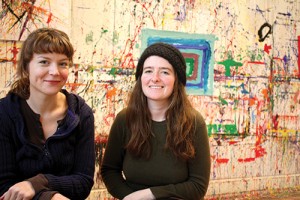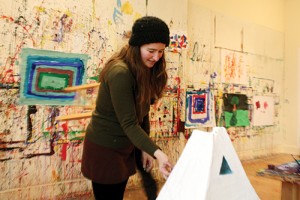At Portland Child Art Studio, white walls are splattered with primary colors and plastered with small green and blue handprints.

Cassandra Moore/VANGUARD STAFf
Hannah Mickunas (left) and Devon Mitchell, cofounders and executive directors of the Portland Child Art Studio. Mickunas is a PSU senior, Mitchell a PSU graduate.
On metal shelving, alongside sculptures made of toilet paper rolls and green strawberry baskets, thick stacks of clean drawing paper lie next to bundles of children’s artwork.
The colorful space belongs to PCAS, an emerging nonprofit located inside the Northwest Children’s Theater and School building at Northwest 18th Avenue and Everett Street.
The studio offers children’s drop-in classes and 10- and four-week sessions.

Cassandra Moore/VANGUARD STAFf
Devon Mitchell, PSU graduate and Portland Child Art cofounder, realized her vision for the studio while traveling in Mexico.
“If you want a career in the arts—and not just to be a painter on the side—I think you have to create your own thing,” said Devon Mitchell, a Portland State graduate and cofounder of the studio.
Mitchell, along with PSU senior Hannah Mickunas, created their “own thing” when they founded PCAS in June, just after Mitchell obtained a second bachelor’s degree in art from PSU.
In their self-built studio space, the two speak softly and slowly; the bright-eyed Mickunas often completes Mitchell’s sentences. Their sister-like dynamic is calming.
Comfortably dismissing a recent report from the Georgetown University Center on Education and the Workforce that called the arts one of the most monetarily worthless fields of study, both Mitchell and Mickunas make confident arguments that art is not about money, and neither is it by any means useless.
“I’m of the feeling that you have to spend your life doing what you love the most, even if it means you don’t make a lot of money,” Mitchell said.
“There are always ways to make enough money to survive, and if you’re doing what you love the most then that equals quality of life, and you can’t put a price tag on that,” she added.
The two women are, in fact, prime examples of young artists finding a way to make a living in an increasingly competitive and do-it-yourself culture.
“There are so many creative young people in Portland,” Mitchell said. “If you’re in the arts, you have to do it yourself.”
Having done just that, the two express gratitude for the help they found along the way and to the serendipitous events that brought them together.
“I feel like [PCAS], the way it came together, was very mystical, like poetry,” Mickunas said.
The chain of events that created PCAS goes back decades to when Mitchell was a child attending the Berkeley Child Art Studio, founded and directed for 30 years by Miriam de Uriarte.
Mitchell still vividly remembers the drippy painted walls in the Berkeley studio and how they felt bumpy under her fingers. Even now, her paintings often feature drippiness, a lasting remnant of that formative studio experience.
Before she conceived of PCAS, Mitchell reconnected with Uriarte and stayed with her while traveling in Mexico, where Uriarte is now retired.
“Never in my mind did I think I was going to Mexico to talk to [Uriarte] about
opening a child art studio. But then, through the course of the week, she started bringing out my childhood art, and other child art, and even pieces of the wall,” Mitchell recalled.
“By the end of the week, I found myself in this room filled with all her materials and books and it was almost like she was handing them to me.”
Cassandra Moore/VANGUARD STAFf
At Portland Child Art STudio, parents are asked to leave so children can explore art-making on their own (with the studio founders).
In an email from Mexico, Mitchell reached out to then-classmate Mickunas, writing that she wanted to bring Uriarte’s vision for childhood perceptual development to Portland.
“I realized that, as someone who was graduating as a painter, as a mother, as someone who engages with this crazy, messy artistic process, it only makes sense to reinvent that place,” Mitchell said. “It seemed like the perfect next step.”
In Portland, Mickunas received the email and couldn’t believe the opportune timing. On her own, she had been musing over ways to be a child art advocate.
“I just jumped in the boat and we started doing the paperwork,” Mickunas said.
Serendipitously brought together, the two women are building a rich community around them and that, said Mitchell, is the point of art.
“There’s something vacuous about art when it’s only about a surface on the wall. But when you bring community or teaching into that, it becomes richer and more meaningful,” she said.
Here to stay for a long time, PCAS is developing a scholarship and sliding scale tuition program. The studio is a space for children, ages two to 12, to explore tactile art creation without there parents.
In March, Mitchell and Mickunas will have a collaborative benefit show for PCAS, using leftover art materials from their own students in the studio.

